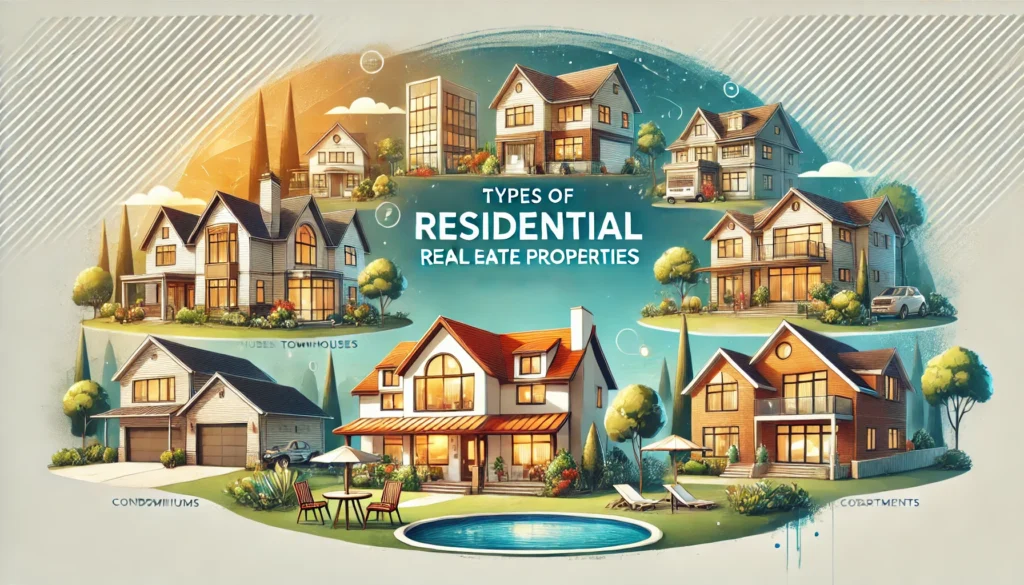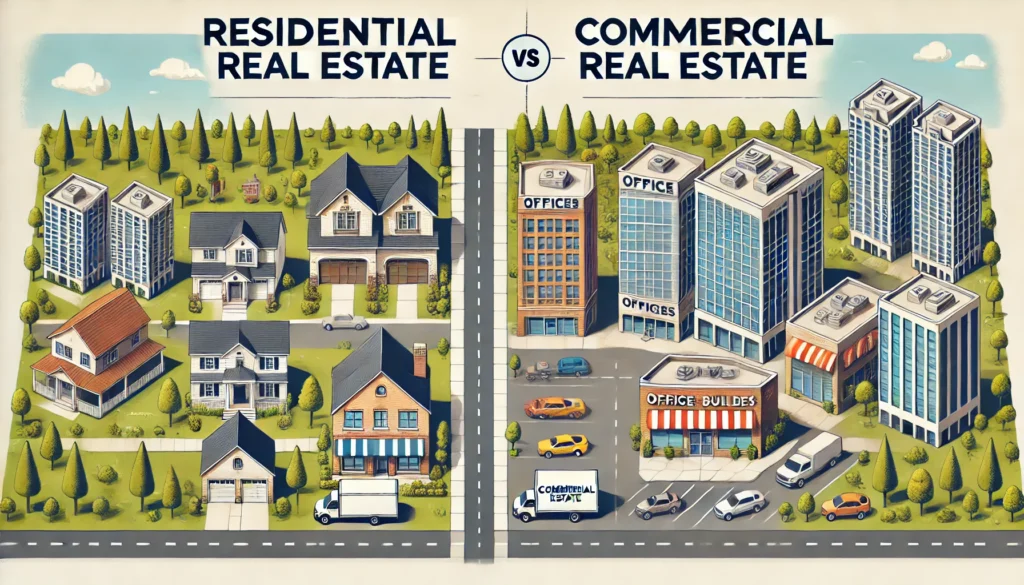Residential real estate is one of the most significant sectors of the real estate market, encompassing property used for residential purposes. Whether you’re a first-time homebuyer, a real estate investor, or simply curious, understanding residential real estate is essential. This guide will walk you through everything you need to know, from its definition and types of real estate to investment opportunities and buying tips.
Introduction to Residential Real Estate
Residential real estate refers to properties used primarily for living or dwelling purposes. This includes single-family homes, condominiums, townhouses, and even vacation homes. Unlike commercial real estate, which is used for business activities, or industrial real estate, which focuses on manufacturing and production, residential properties are meant for personal use by individuals or families. Residential real estate plays a vital role in the economy, as it provides housing and serves as a key investment avenue. Did you know that residential properties make up over 70% of the U.S. real estate market? This highlights its importance in the real estate landscape.
Types of Residential Real Estate Properties

Residential real estate encompasses a wide range of types of residential properties, each catering to different lifestyles and needs. Single-family homes are the most common type, offering privacy and space for families. Multifamily homes, such as duplexes and apartment buildings, are ideal for those looking to generate income from rental property. Condominiums, or condos, are individually owned units within a larger building, offering shared common areas like gyms and pools. Townhouses are multilevel homes that share walls with neighboring properties but come with their land. Coops, or cooperative housing, involves owning shares in a corporation that owns the building, rather than owning the property outright. Lastly, vacation homes and second homes fall under residential real estate, providing a getaway or additional living space for owners.
Key Features of Residential Real Estate
Residential real estate is characterized by its purpose—providing a place to live. Location is a critical factor, as properties in desirable areas tend to appreciate faster. Zoning laws also play a significant role, as they dictate how land can be used and what types of structures can be built. Amenities such as parks, schools, and shopping centers add value to residential properties, making them more attractive to buyers and renters. Unlike commercial property, residential real estate is often subject to stricter regulations to ensure the safety and comfort of occupants.
Benefits of Investing in Residential Real Estate
Investing in residential real estate offers numerous investment opportunities. One of the most appealing benefits is the potential for steady rental income. Properties in high-demand areas can generate consistent cash flow, making them a reliable source of passive income. Additionally, residential real estate tends to appreciate over time, providing long-term value growth. Homeowners and investors can also take advantage of tax benefits, such as deductions on mortgage interest and property taxes. Furthermore, residential properties are tangible assets, offering a sense of security and stability that other investments may lack. For those looking to diversify their portfolio, residential real estate is an excellent option.
Residential vs. Commercial Real Estate

While both residential and commercial real estate are valuable investment options, they serve different purposes. Residential properties are designed for living, whereas commercial properties are used for business activities. Lease terms in residential real estate are typically shorter, ranging from six months to a year, while commercial leases can span several years. Tenant relationships also differ, as residential tenants are often individuals or families, while commercial tenants are businesses. In terms of investment, residential real estate is generally considered less risky but may offer lower returns compared to commercial properties. Understanding these differences is crucial when deciding where to invest.
How to Buy Residential Real Estate
Buying residential real estate is a significant milestone, but it requires careful planning and preparation. The first step is to determine your budget and get preapproved for a mortgage. This will give you a clear idea of how much you can afford and strengthen your position as a buyer. Next, choose the right location based on factors like schools, commute times, and safety. Working with a real estate agent can simplify the process, as they have access to listings and can negotiate on your behalf. Once you’ve found a property, a home inspection, and appraisal are essential to ensure the property is in good condition and priced fairly. Finally, closing the deal involves understanding closing costs and completing the necessary paperwork.
Can You Buy Residential Property in a City?
Yes, you can purchase residential real estate in a city, and it is a common investment strategy. Urban areas often offer strong demand for housing due to population density, job opportunities, and amenities, making them attractive for real estate investors. When purchasing residential property in a city, consider factors such as location, property condition, market trends, and potential rental income or resale value. Cities may have higher property prices compared to suburban or rural areas, but they also tend to offer higher rental yields and appreciation potential. Additionally, urban properties can cater to various investment strategies, such as long-term rentals, short-term vacation rentals (e.g., Airbnb), or house flipping. Before buying, research local regulations, zoning laws, and tax implications, and ensure the property aligns with your financial goals and budget. Working with a real estate agent familiar with the city’s market can also help you make an informed decision.
How to Start Investing in Residential Real Estate
To start investing in residential real estate, you can explore several strategies based on your financial goals, risk tolerance, and level of involvement. One common approach is purchasing rental properties, where you buy a home or apartment and rent it out to tenants, generating passive income and potential long-term appreciation. Another option is house flipping, which involves buying undervalued properties, renovating them, and selling them for a profit. For those seeking lower upfront costs and less hands-on management, real estate investment trusts (REITs) allow you to invest in residential properties indirectly through publicly traded companies. Additionally, crowdfunding platforms enable you to pool funds with other investors to finance real estate projects. Lastly, consider buying a multifamily home and living in one unit while renting out the others, a strategy known as house hacking. Each method has its risks and rewards, so it’s essential to research, plan, and possibly consult a financial advisor to determine the best path for your investment goals.
Financing Options for Residential Real Estate
Financing is a critical aspect of purchasing residential real estate. Mortgages are the most common option, with various types available, including fixed rate, adjustable rate, FHA, and VA loans. Down payments typically range from 3% to 20% of the property’s price, depending on the loan type. Government programs, such as first-time homebuyer incentives, can make homeownership more accessible. For those who don’t qualify for traditional financing, alternative options like seller financing or lease-to-own agreements may be available. Understanding your financing options is key to making an informed decision.
Residential Property Tax
Residential property tax is a levy imposed by local governments on homeowners and real estate investors based on the assessed value of their residential properties. These taxes are a primary source of revenue for municipalities and fund essential services such as schools, infrastructure, public safety, and community programs. The amount of property tax owed is calculated by multiplying the property’s assessed value by the local tax rate, which varies by jurisdiction. Assessed values are typically determined by government assessors and may differ from market value. Property taxes are recurring and paid annually or semi-annually, depending on local regulations. Homeowners and investors should be aware of potential tax deductions, such as mortgage interest and property tax payments, which can reduce taxable income. It’s important to stay informed about local tax laws, exemptions, or reassessment opportunities, as these can impact the overall cost of owning residential property. Properly budgeting for property taxes is crucial for maintaining profitability and avoiding financial strain
Trends in Residential Real Estate
The residential real estate market is constantly evolving, influenced by societal changes and technological advancements. The rise of remote work has led to increased demand for homes with dedicated office spaces and larger living areas. Sustainability is another growing trend, with more buyers seeking eco-friendly features like solar panels and energy-efficient appliances. Smart home technology, such as automated lighting and security systems, is also becoming increasingly popular. Additionally, generational shifts are shaping the market trends, as millennials and Gen Z enter the housing market with different preferences and priorities.
Challenges in Residential Real Estate
While residential real estate offers many benefits, it also comes with its share of challenges. Market trends and volatility can impact property values, making it difficult to predict returns. Maintenance costs are an ongoing expense for homeowners, from routine repairs to unexpected emergencies. For landlords, tenant issues like late payments or property damage can be a headache. Regulatory changes, such as new zoning laws or tax policies, can also affect property ownership and investment strategies. Being aware of these challenges can help you navigate the market more effectively.
Tips for First Time Homebuyers

If you’re a first-time homebuyer, the process can seem overwhelming. Start by researching the real estate market to understand local market trends and prices. Saving for a down payment is crucial, so consider setting up a dedicated savings account or exploring down payment assistance programs. Getting pre-approved for a mortgage will give you a clear budget and make you a more competitive buyer. When viewing properties, don’t skip the home inspection—it can save you from costly repairs down the line. Finally, think long-term about your needs, such as family size or job location, to ensure your new home will meet your future requirements.
Expectations of Residential Property Management
Residential property management involves overseeing and maintaining rental properties to ensure they are profitable, well-maintained, and attractive to tenants. Key expectations include tenant management, such as screening applicants, handling leases, and addressing tenant concerns or disputes promptly. Property managers are also responsible for rent collection, ensuring timely payments, and pursuing late payments if necessary. Maintenance and repairs are critical, requiring managers to coordinate routine upkeep, emergency fixes, and property inspections to preserve the property’s value and comply with safety regulations. Financial management is another expectation, as managers must budget for expenses, handle accounting, and provide owners with detailed financial reports. Additionally, property managers should stay informed about local landlord-tenant laws and ensure compliance to avoid legal issues. Effective communication with both property owners and tenants is essential to maintain trust and satisfaction. Ultimately, the goal of residential property management is to maximize rental income, minimize vacancies, and protect the property’s long-term value.
Conclusion
Residential real estate is a cornerstone of the property market, offering a wide range of investment opportunities and housing options for individuals or families. From single-family homes to multi-family homes and condominiums, the sector caters to diverse needs and lifestyles. Investing in residential properties provides benefits like steady rental income, long-term appreciation, and tax advantages, making it a popular choice for both homeowners and real estate investors. However, challenges such as market trends, maintenance costs, and regulatory changes require careful consideration. Whether you’re a first-time homebuyer or an experienced investor, understanding the nuances of residential real estate—from financing options to property management—is key to making informed decisions and achieving your financial goals.
As you know Dream Renew is providing value according to real estate.
Frequently Asked Questions (FAQs)
Can I invest in residential real estate with little money?
Yes, options like FHA loans, down payment assistance programs, and partnerships can help you enter the market with limited funds.
What are the tax benefits of owning residential property?
Homeowners can deduct mortgage interest, property taxes, and certain home improvement expenses from their taxable income.
How do I choose the right residential property for my needs?
Consider factors like location, budget, size, and future needs when selecting a property.
What are the risks of investing in residential real estate?
Risks include market fluctuations, maintenance costs, tenant issues, and regulatory changes.
What are the key steps involved in the process of selling residential real estate?
Selling residential real estate involves several key steps:
- Prepare the Property: Clean, declutter, and make necessary repairs or upgrades to enhance appeal.
- Set the Right Price: Work with a real estate agent or appraiser to determine a competitive market value based on market trends and comparable properties.
- List the Property: Market the property through online listings, social media, and traditional methods like yard signs.
- Show the Property: Host open houses or private showings for potential buyers.
- Receive Offers: Evaluate offers, negotiate terms, and select the best one.
- Complete Inspections and Appraisals: Allow the buyer to conduct a home inspection and appraisal to finalize financing.
- Close the Sale: Sign legal documents, transfer ownership, and receive payment.
How can one assess the value of a residential property before buying?
To assess the value of a residential property:
- Research Comparable Sales: Look at recent sales of similar properties in the area (market trends).
- Hire a Professional Appraiser: Get an unbiased valuation based on the property’s condition, location, and features.
- Evaluate Location: Consider proximity to schools, transportation, and amenities.
- Inspect the Property: Assess its condition, age, and any needed repairs.
- Check Market Conditions: Analyze whether it’s a buyer’s or seller’s market to understand pricing dynamics.
6. Use Online Tools: Utilize platforms like Zillow or Redfin for estimated property values.
Can you build a business on residential property?
Yes, you can build a business on residential property through various strategies:
- Rental Properties: Generate steady income by renting out single-family homes or multi-family homes.
- House Flipping: Buy undervalued properties, renovate them, and sell for a profit.
- Vacation Rentals: List properties on platforms like Airbnb for short-term rentals.
- Property Management: Offer services to manage rental properties for other owners.
- Real Estate Development: Build or renovate residential properties for sale or rent.
Each approach requires careful planning, market research, and compliance with local regulations.
Can you rent commercial property as residential in Texas?
In Texas, renting commercial property as residential is generally not allowed due to zoning laws. Commercial and residential properties are subject to different regulations, and mixing uses typically require special permits or rezoning. However, some mixed-use properties or live-work spaces may allow limited residential use. Always check local zoning laws and consult with a real estate agent or legal expert before attempting to convert or rent commercial property for residential purposes.




